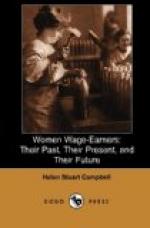In the struggle for supremacy, “woman at once became property, since anything that affords its possessor gratification is property. Woman was capable of affording man the highest of gratifications, and therefore became property of the highest value. Marriage, under the prevailing form, became the symbol of transfer of ownership, in the same manner as the formal seizing of lands. The passage from sexual service to manual service on the part of women was perfectly natural.... And thus we find that the women of most savage tribes perform the manual and servile labor of the camp.”
“The basis of all oppression is economic dependence on the oppressor,” is the word of a very keen thinker and worker in the German Reichstag to-day; and he adds: “This has been the condition of women in the past, and it still is so. Woman was the first human being that tasted bondage. Woman was a slave before the slave existed.”
Science has demonstrated that in all rude races the size and weight of the brain differ far less according to sex than is the case in civilized nations. Physical strength is the same, with the advantage at times on the side of the woman, as in certain African tribes to-day, over which tribes this fact has given them the mastery. Primeval woman, all attainable evidence goes to show, started more nearly equal in the race, but became the inferior of man, when periods of child-bearing rendered her helpless and forced her to look to him for assistance, support, and protection.
When the struggle for existence was in its lowest and most brutal form, and man respected nothing but force, the disabled member of society, if man, was disposed of by stab or blow; if woman, and valuable as breeder of fresh fighters, simply reduced to slavery and passive obedience. Marriage in any modern sense was unknown. A large proportion of female infants were killed at birth. Battle, with its recurring periods of flight or victory, made it essential that every tribe should free itself from all impedimenta. It was easier to capture women by force than to bring them up from infancy, and thus the childhood of the world meant a state in which the child had little place, save as a small, fierce animal, whose development meant only a change from infancy and its helplessness to boyhood and its capacity for fight.
Out of this chaos of discordant elements, struggling unconsciously toward social form, emerged by slow degrees the tribe and the nation, the suggestions of institutions and laws and the first principles of the social state. Master and servant, employer and employed, became facts; and dim suspicions as to economic laws were penetrating the minds of the early thinkers. The earliest coherent thought on economic problems comes to us from the Greeks, among whom economic speculation had begun almost a thousand years before Christ. The problem of work and wages was even then forming,—the sharply accented difference between theirs and ours lying in the fact that for Greek and Roman and the earlier peoples in the Indies economic life was based upon slavery, accepted then as the foundation stone of the economic social system.




